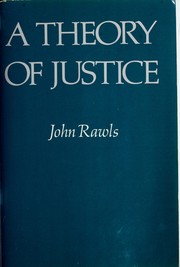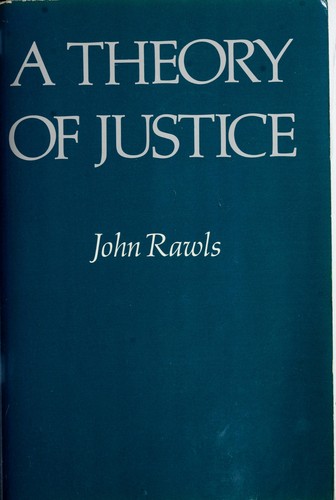Check nearby libraries
Buy this book

This volume is a widely-read book of political philosophy and ethics. Arguing for a principled reconciliation of liberty and equality, it attempts to solve the problem of distributive justice (this concerns what is considered to be socially just with respect to the allocation of goods in a society). The resultant theory is known as "Justice as Fairness", from which the author derives his two famous principles of justice. The first of these two principles is known as the equal liberty principle. The second principle is split into two parts; the first, known as fair equality of opportunity, asserts that justice should not benefit those with advantageous social contingencies; while the second, reflecting the idea that inequality is only justified if it is to the advantage of those who are less well-off, is known as the difference principle.
Check nearby libraries
Buy this book

Previews available in: English
Subjects
Justice, Philosophy, Ethics, Law, Political science, Social Justice, Rechtvaardigheid, Gerechtigkeit, Rechtsphilosophie, Theorie, Politische Philosophie, Philosophie politique, Justice sociale, Law, philosophy, Philosophy, modern, Justice (Philosophy), Human Rights, Jurisprudence, Jc578 .r38 1999, 320/.01/1Showing 5 featured editions. View all 16 editions?
| Edition | Availability |
|---|---|
|
1
A theory of justice
2005, Belknap Press of Harvard University Press
in English
- Original ed.
0674017722 9780674017726
|
zzzz
|
|
2
A Theory of Justice
September 30, 1999, Belknap Press
Paperback
in English
- Revised edition
0674000781 9780674000780
|
zzzz
|
| 3 |
zzzz
|
|
4
A theory of justice.
1971, Belknap Press of Harvard University Press
in English
0674880102 9780674880108
|
eeee
|
| 5 |
aaaa
|
Book Details
Edition Notes
Bibliogr.
4
Classifications
The Physical Object
Edition Identifiers
Work Identifiers
Source records
The Laurentian Library MARC recordInternet Archive item record
Marygrove College MARC record
Internet Archive item record
Better World Books record
Internet Archive item record
Internet Archive item record
Promise Item
marc_columbia MARC record
harvard_bibliographic_metadata record
Work Description
The principles of justice Rawls set forth in this book are those that free and rational people would accept in an initial position of equality. In this hypothetical situation, which corresponds to the state of nature in social contract theory, no one knows his or her place in society; his or her class position or social status; his or her fortune in the distribution of natural assets and abilities; his or her intelligence, strength, and the like; or even his or her conception of the good. Thus, deliberating behind a veil of ignorance, people determine their rights and duties. The first section of A Theory of Justice addresses objections to the theory and discusses alternative positions, especially utilitarianism. Rawls then applies his theory to the philosophical basis of constitutional liberties, the problem of distributive justice, and the grounds and limits of political duty and obligation. He includes here a discussion of civil disobedience and conscientious objection. Finally, he connects his theory of justice with a doctrine of the good and of moral development. This enables him to formulate a conception of society as a social union of social unions, and to use his theory of justice to explain the values of community. Since its first appearance in 1971, A Theory of Justice has been continuously taught and debated, and translated into twenty-four languages. This revised edition includes changes, discussed in the preface, which Rawls considered to be significant, especially to the discussions of liberty and primary social goods. - Back cover.
Community Reviews (0)
| March 17, 2024 | Edited by ImportBot | import existing book |
| December 19, 2023 | Edited by ImportBot | import existing book |
| December 10, 2023 | Edited by MARC Bot | import existing book |
| December 8, 2022 | Edited by MARC Bot | import existing book |
| October 13, 2009 | Created by WorkBot | create work page |


















